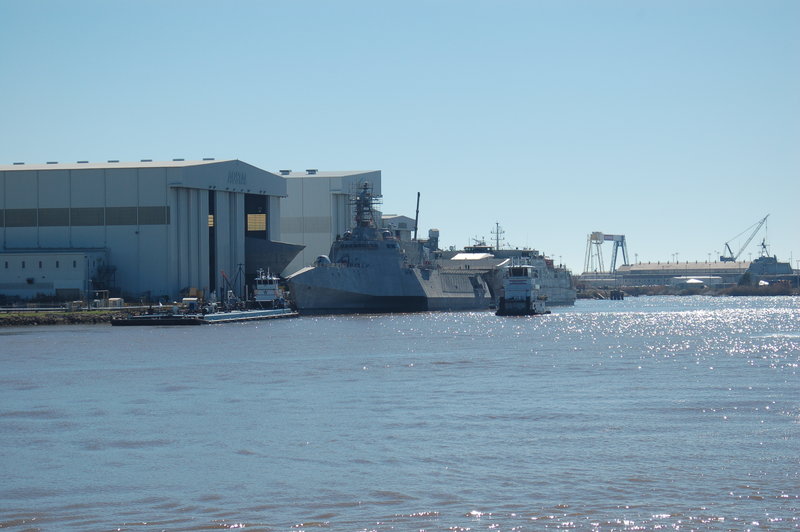Austal USA christened the U.S. Navy's 16th littoral combat ship (LCS), the future Tulsa, over the weekend. Tulsa is the sixth LCS in Austal’s 11-ship contract, worth over $3.5 billion. The Austal-built 419'x99' Independence-variant LCS is a high-speed, aluminum trimaran combat ship that is designed to combine superior seakeeping, endurance and speed with the volume and payload capacity needed to support emerging missions.
The following are the mission requirements of the aluminum trimaran LCS:
- Mine Warfare Module — Transforms the ship’s mission by embarking a self-contained package of 15 crewmembers, sensors and weapons to hunt, identify, localize and neutralize mines.
- Anti-Submarine Warfare Module — Transforms the ship’s mission by embarking a self-contained package of 15 crewmembers, sensors and weapons to detect, track and neutralize quiet diesel-electric submarines operating in shallow water.
- Surface Warfare Module — Transforms the ship’s mission by embarking a self-contained package of 12 crewmembers, sensors and weapons to search, detect, localize and engage small boats.
With a draft of 14', marine crew of 40 and total crew of 110 and displacement of 2,675 metric tons, the Tulsa’s main propulsion comes from twin GE LM2500 gas turbine engines, producing 29,500 hp and two MTU 20V8000 diesel engines, putting out 12,200 hp total. The engines are connected to Wartsila waterjets that give the Austal USA LCS a running speed of 40 knots.
Cruising range is 3,500 nautical miles (4,500 nautical miles at cruising speed of 16 knots and 1,500 nautical miles at 36 knots or better.) Auxiliary equipment includes 32 vertical launch system missiles, 57mm forward gun, eight harpoon missiles, two close-in weapons systems, and six ASW torpedoes.
The Tulsa (LCS 16) will launch in mid-March and is scheduled for delivery in 2018. The vessel has a voluminous 28,000 sq. ft. mission bay, and a flight deck capable of simultaneously holding two H-60 helicopters.
Austal’s LCS program has delivered five ships and six ships remain under construction. Omaha (LCS 12) will conduct builder’s sea trials later next month. Manchester (LCS 14) is also preparing for trials. Final assembly is well underway on Charleston (LCS 18) and modules for Cincinnati (LCS 20) and Kansas City (LCS 22) are under construction in Austal’s module manufacturing facility.
“We are proud to provide an awesome combat ship to our nation’s incredible sailors. One that will honor the great city of Tulsa as she defends our nation around the globe,” Austal USA President Craig Perciavalle said in remarks during the christening at the shipyard’s facility in Mobile. Ala. “We’re equally excited to share this celebration with an amazing patriot in Kathy Taylor who has served veterans and active duty military in so many ways, and now infuses her spirit as the sponsor into this incredible ship and her crew.”
Taylor was Tulsa’s 38th mayor and is currently Chief of Economic Development for Tulsa’s sitting Mayor, G.T. Bynum. Her administration hired the first veteran’s liaison in the Mayor’s office, helped establish the first veteran’s court in the nation, formed the Tulsa Veterans Advisory Council and worked with local colleges to increase veteran enrollment and completion of college. In 2006, Taylor visited all branches of the U.S. Armed Forces as a member of the U.S. Department of Defense civilian task force traveling throughout the Middle East. She later partnered with Tulsa’s 211 Service Helpline to improve communication about services and benefits available to active duty military and veterans.
Traditionally, the christening of a ship is where the ship's sponsor blesses the ship by breaking the bottle of champagne on the bow of the ship and ceremonially gives the ship its name. The roll of sponsorship represents a lifelong relationship with the ship and her crew.




